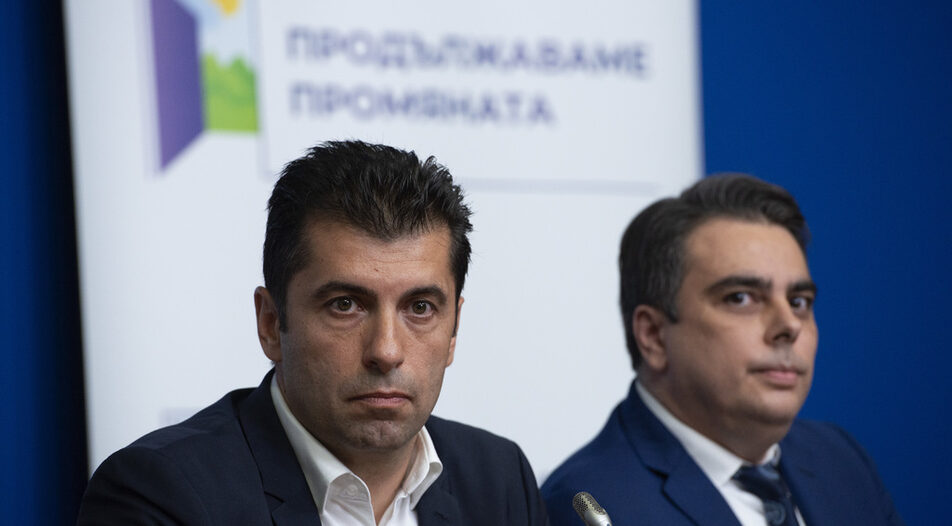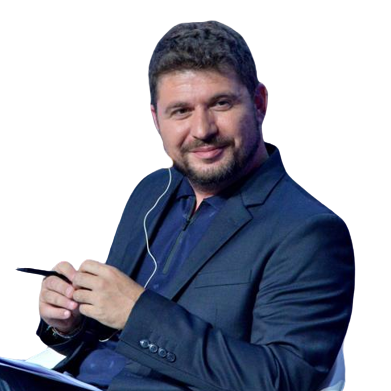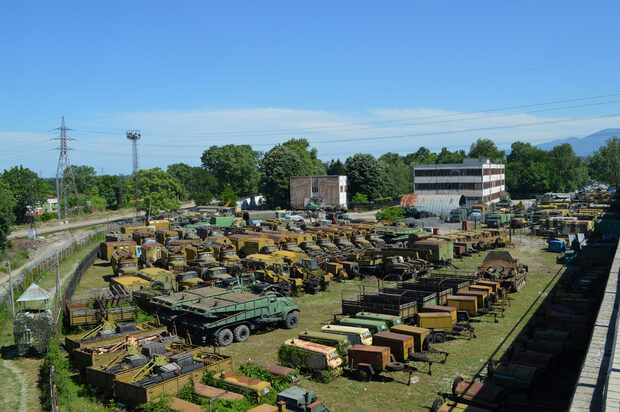It was a bad week for young, bold and outspoken prime ministers from Eastern Europe. Kiril Petkov in Bulgaria and Kaja Kallas in Estonia both lost their ruling coalition partners and now face the collapse of their governments.
While it's tempting to present this as a Russian victory in the neighborhood - after all, both Petkov and Kallas were strong anti-Russian voices in the EU after the Ukraine invasion - it's also a truism that all politics is local.
Petkov's coalition - and the fact that it managed to get off the ground at all - was always somewhat miraculous. He and his political partner Assen Vassilev (deputy PM and finance minister) managed to forge a workable bloc from 2 wildly different political movements and 2 very different parties. It took some heavy bargaining and lots of talks.
This bloc stumbled through a contested budget, roadblocks such as disbanding the specialized courts and prosecution, and although the inflation and the war wounded them badly, they still seemed to hold on together, against all odds.
And then something during the budget actualization threw them off the path.
In all honesty, I am still not convinced exactly what incited There is Such a People Party (TISP) to walk away and withdraw its ministers. They've offered various explanations. Their leader Slavi Trifonov rambled in a Facebook video about the "national betrayal of Macedonia" and about the state not having any money thanks to the wild spending of Vassilev and Petkov. Minister for Regional Development Grozdan Karadzhov said it was because they haven't accepted his proposal for an additional 4 billion leva towards his road repairs budget. The leader of TISP parliamentary group said it was because "Petkov and Vassilev simply take bad decisions".
Yet none of this sounds plausible.
Yes, Petkov was looking for a way to break the impasse over N. Macedonia but that is what he must do, being in charge. Trifonov's stance on the issue, which seems to imply that there is nothing we can do about worsening relations with a neighboring country, looks a lot like a useful excuse.
The road repairs are a big issue, admittedly, because the almighty road-cartel is hungry and pulling all levers. But Karadzhov had enough money to pay the agreed amounts for now and even if he wanted to pay them more, how is that achievable when he throws in the towel?
And his claim that all the money has been spent is highly dubious anyway. Spending is record-high, that's true, yet revenues are also up, economic growth tops 4% and Bulgaria is on the verge of receiving the biggest pay-package from the EU ever recorded. We are, quite literally, awash with money.
So what was it, then?
Let me offer a guess. When this government came, its main objective was to dismantle the previous system of one-man rule by GERB and Boyko Borissov and all the patronage networks, built up over the previous decade. This is a lot of work versus a lot of pressure, with not much to show for it, because large parts of the state apparatus - from prosecution service to local authorities - are still controlled by GERB.
Petkov and Vassilev are very far from perfect: they had some good ideas and, yes, committed some gaffes. Yet, overall, the longer GERB were out of power, the more those networks were weakened. Russian gas is one of those. The latest example was the border story we told you about last week. There are powers in this country (and beyond) which would like nothing more than to see this government collapse, because they are now convinced chaos is a better alternative than an order they can't control. Willingly or not, TISP has sided with them.
This is uncharted waters again but this time the world out there is a lot scarier than it was last year.
This newsletter was helped by
POLITICS THIS WEEK
So some practicalities. What's next for the cabinet?
There are three basic scenarios ahead:
Scenario 1: A minority government
Needless to say, this would be the hardest one to pull off and one without precedent in modern Bulgarian political history. Despite that, it appears Mr Petkov is adamant to try it and his two remaining allies - Democratic Bulgaria and BSP - declared their commitment to the current ruling coalition. In this case, Mr Petkov would need at least "12 brave MPs" (his own words), likely from the TISP ranks, to break party ranks and back him in Parliament when he nominates his replacements of the outgoing ministers.
There are obvious problems with this model - it relies on renegades from TISP or on support from MRF and GERB, which is obviously undesirable as it would diminish the anti-corruption credentials of the coalition.
So, Mr Petkov can perhaps try to delay appointing new ministers while probing for support and searching for a new governing formula, then seek support (including by quorum games with the opposition) in pursuing his party's agenda.
Scenario 2: A new Prime Minister and a new cabinet
The Petkov government can rule until the National Assembly votes on his resignation or if he loses a vote of no confidence (or the new budget vote) submitted by the opposition. If the cabinet falls, the Constitution gives the winner in the last elections - WCC - a second chance to form a cabinet with the same PM, or with somebody else at the helm.If WCC fails to find enough support then President Rumen Radev hands the second mandate to GERB, the second largest party in Parliament.
If they also fail to form a cabinet, the head of state chooses which party to entrust with the third attempt to form a government.
Scenario 3: New elections (and a pro-Russian parliament)
Now we are getting to the grim scenarios. If the roulette with the mandates fails on three occasions to produce results, the President will dissolve the National Assembly, assign a caretaker cabinet and Bulgaria will have elections in the early autumn.
An early vote would certainly reproduce the fragmented parliament, but instead of TISP, we would likely get a more vociferous, emboldened Vazrazhdane (with its declared priorities being halting euro adoption and even referendums on EU and NATO membership), as well as the entry of Stefan Yanev's Bulgarian Rise in Parliament, which is overtly pro-Russian, and not so openly anti-Western.
These results would likely be helped by a new caretaker government appointed by Mr Radev, who is not hiding his preference for that same mix of "patriotism and neutrality".
Back to square one
The result will likely see Bulgaria lose even more clout in the EU and NATO - been there, done that. Luckily, at the moment it does not appear that most of the parties in parliament (ruling or opposition) have much appetite for elections. The only ones interested in new elections are Vazrazhdane and Bulgarian Rise, and also the MRF, which can hope for a configuration more favorable to its interests.
N. Macedonia: the collateral damage
The past three days has seen the death knell of the current efforts to break the deadlock between Sofia and Skopje. While it is utterly senseless and incredibly irresponsible to paint any effort of reaching a compromise as "betrayal", this is what many political leaders here do. History will not judge them kindly, but here and now, they are making sure Bulgaria loses every last option of living in a quiet neighborhood.
ECONOMY
The new budget framework
Is going to get a vote in parliament at some point, after it was voted by the government this week (without TISP). Yet it's highly doubtful it will pass.
A good place for business, after all
That is what German investors here think Bulgaria is, according to a German-Bulgarian chamber poll in April. Main issues: lack of workers and high energy prices.
Figures:
4%
Is the GDP growth for the first quarter of the year.
3.3%
Rise in electricity prices for households in June, but the heating bill is a huge concern - it might go up by at least 20%.
358 million levs
Is what the tunnel under the Balkan mountain will cost. The deal for the Shipka tunnel was signed this week and the tunnel should be ready in 2 years time. BUSINESS
Software
The Bulgarian company wants to acquire 55% of TBI info. The smaller software company has 3 million levs in revenue for 2021 and 40 workers.
Candy
Varna-based company has bought Plovdiv's "Krystal" sugar brands. Plovdiv factory was once a leader in the market but has long been in decline. The brands which are famous nationwide are its main remaining asset.IN THE WEEK
Football
Black bets are onLast Sunday, Sports Minister Radostin Vassilev announced that the Bulgarian 1st Professional League was under investigation over alleged dubious betting. He added that an investigation has started in Brussels over a match played in mid-May and which triggered more accusations against the Bulgarian Football Federation and its leader Borislav Mihaylov. Recently, investigative media Bird reported that Mihaylov is linked to the famous match fixing guru Dan Tan. Check out KInsights' report from Thursday.
European politics
Renew Europe and Delyan PeevskiIt's an ongoing story that Macron wants Kiril Petkov's party in his political project. Yet numerous sources have claimed Petkov has rejected the offer before there is a clear dividing line between whatever Renew Europe morphs into and MRF - the Bulgarian Turkish party which is synonymous with corruption and headlined by Magnitsky-sanctioned Delyan Peevski. Currently, MRF gains a European clout of acceptance by being a member and co-chair of ALDE. Petkov has got MRF party quite nervous, it seems. WATCH OUT FOR
People:
Kenneth Mertenthe career diplomat from the USA who worked in Haiti during the devastating earthquake of 2010 and in Croatia, will be the new US ambassador in Sofia, the White House announced on Wednesday.
Alexander Nikolov
the current energy minister from TISP is rumored to be one of those who Kiril Petkov lobbies to stay in the government.
Location
Old socialist blocksIn Sofia, where square meter prices have reached 2500-3000 euro, claimed real estate agents this week - due to the inflation and shortages in new construction.
WORD OF THE WEEK
Нямам ток (I have no electricity)This week's political tensions nevertheless produced, besides the drama, some pretty funny reactions. The best came from former PM and GERB leader Boyko Borissov, who, when asked by Dnevnik.bg what he thought of the crisis in the ruling coalition on Wednesday evening, said: "I don't know what's going on, I have no electricity." He added that the power cut and the flood following the heavy rain were, obviously, the fault of "the Change," as he short-handedly calls the coalition.
After the Dnevnik piece with Mr Borissov's words in the title exploded on social media, some witty users commented that they, unlike the former PM, have electricity, but still don't know what's going on in the ruling coalition!
It was a bad week for young, bold and outspoken prime ministers from Eastern Europe. Kiril Petkov in Bulgaria and Kaja Kallas in Estonia both lost their ruling coalition partners and now face the collapse of their governments.
While it's tempting to present this as a Russian victory in the neighborhood - after all, both Petkov and Kallas were strong anti-Russian voices in the EU after the Ukraine invasion - it's also a truism that all politics is local.













